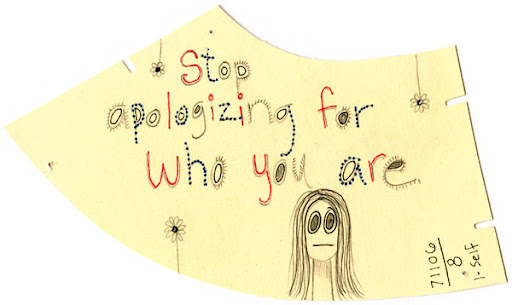Chronic self-apology slowly erodes your self-worth like water dripping on stone. When you constantly say “sorry” for existing, you're telling yourself and others that you're an inconvenience. Break this habit by pausing before apologizing, substituting “thank you” for “sorry,” and remembering that setting boundaries isn't rude—it's healthy. Your voice deserves space in conversations without disclaimers or minimization. The path to authenticity begins when you stop apologizing for simply being you.
Key Takeaways
- Recognize that habitual apologizing diminishes your perceived competence and signals that your presence is an inconvenience to others.
- Replace unnecessary “sorry” statements with confident alternatives that maintain politeness without undermining your self-worth.
- Establish clear personal boundaries to prevent apologizing for taking up space or expressing your authentic needs and opinions.
- Practice pausing before speaking to evaluate whether an apology is truly warranted or simply a reflexive habit.
- Understand that assertiveness is a skill that strengthens with practice, allowing you to communicate more authentically and confidently.
The Hidden Costs of Chronic Self-Apology

While you might think your constant apologies are harmless, they're silently draining your self-esteem like a slow leak in a tire.
Every “sorry” for simply existing in a meeting, speaking up, or taking space chips away at your sense of worth. You're fundamentally telling yourself and others that your presence is an inconvenience.
This habit creates a feedback loop where others begin to see you as less competent or confident than you actually are. It's like wearing a sign that says, “Don't take me seriously!”
Your brain starts to believe this narrative too, making you hesitate when opportunities arise. Before you know it, you're apologizing for apologizing—a ridiculous cycle that would be funny if it weren't so costly to your professional growth and personal happiness.
Recognizing When You're Apologizing for Your Existence
Before you can break the apology habit, you need to catch yourself in the act. Pay attention to how often you say “sorry” for simply taking up space—like when you squeeze past someone in a crowded room or ask a legitimate question during a meeting.
You're not actually causing harm in these moments, just existing as a human with needs and boundaries.
Watch for those sneaky apologetic behaviors too, like the excessive email disclaimers (“Sorry to bother you…”) or the reflexive apologies when someone bumps into you.
Even your body language might be saying “sorry”—hunched shoulders, avoiding eye contact, or that nervous laugh you use when stating an opinion. These subtle signals tell others, and worse, yourself, that your presence requires justification.
The Cultural and Social Roots of Excessive Apologizing
Although we often treat chronic apologizing as a personal quirk, it's actually deeply embedded in our cultural fabric. From an early age, you're taught to be polite, to make room for others, and to avoid taking up too much space.
These lessons hit differently depending on your gender, class, and cultural background. Women, for instance, are socialized to be accommodating and non-threatening, making “sorry” their default opener in conversations.
You've probably noticed how certain family dynamics train some members to apologize for their opinions, needs, or mere presence. Meanwhile, various professional environments reward those who soften their requests with apologetic language.
It's not just you—it's the systems you've grown up in that have programmed these reflexive “sorrys” into your daily interactions.
Reclaiming Your Voice: Setting Healthy Boundaries
Once you've recognized the patterns of excessive apologies in your life, it's time to rebuild your communication style from the ground up.
Think of boundaries as your personal property lines—they define where you end and others begin. Start small by pausing before automatically saying “sorry.” Ask yourself: Did I actually do something wrong, or am I just taking up space?
Practice alternative phrases that maintain politeness without self-deprecation. Instead of “Sorry to bother you,” try “Thanks for your time.”
When someone pushes back against your newfound boundary-setting (and they will), remember that their discomfort isn't your emergency. You're not being rude; you're being authentic.
The people who truly belong in your life will adjust to the real you—not the apologetic shadow version you've been presenting to the world.
The Powerful Distinction Between Accountability and Self-Erasure

Self-erasure, on the other hand, is that constant, exhausting habit of minimizing yourself to make others comfortable.
It's the difference between “Sorry I interrupted you” (reasonable) and “Sorry for having thoughts” (um, what?).
You can respect others' boundaries while still taking up your rightful space in the world.
Remember, accountability strengthens your relationships, while self-erasure slowly dissolves your identity.
Next time you apologize, ask yourself: “Am I taking responsibility, or am I apologizing for existing?”
Practical Strategies to Break the Apology Habit
Practice pausing before speaking, giving yourself time to reflect if an apology is truly warranted. When you catch yourself mid-sorry, don't beat yourself up—just redirect.
Remember, assertiveness is a muscle that grows stronger with use.
Create a small support system of friends who'll gently call you out when you apologize for existing. They'll help you recognize patterns you might miss.
Finally, celebrate your progress—breaking ingrained speech habits isn't easy, but each small victory moves you toward authentic self-expression.
Embracing Authenticity as Radical Self-Acceptance
Try these radical self-acceptance practices:
- Replace “Sorry I'm late” with “Thanks for waiting for me”
- Stand in front of a mirror and name three things you love about yourself
- Write down situations where you apologize needlessly, then create alternative responses
- Practice saying “That's just who I am” without adding “sorry” at the end
Conclusion
You've spent too much time shrinking yourself to fit other people's expectations—it's time to take up space unapologetically. Studies show that the average person apologizes about 8 times per day, but women apologize 37% more than men. Next time you feel that familiar “sorry” rising to your lips, pause and ask yourself: “Am I apologizing for a mistake, or for my existence?” Your authentic self isn't something to apologize for—it's your greatest strength.

